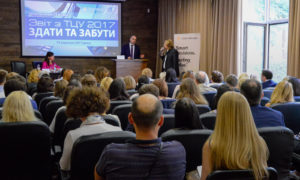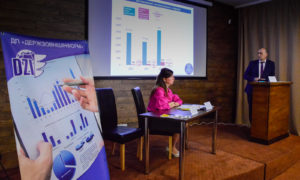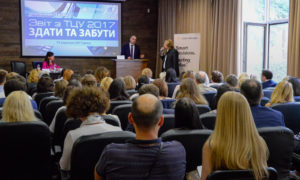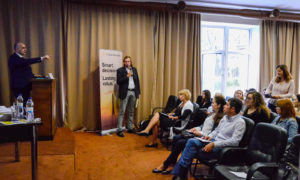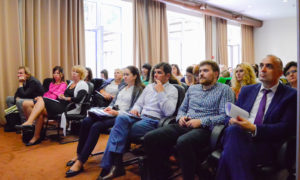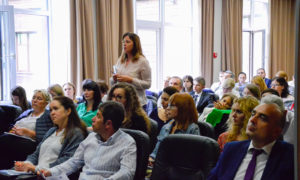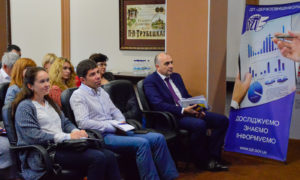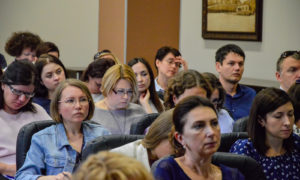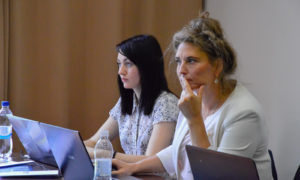Transfer Pricing seminar in Kiev
Kiev, Park-Hotel “Holosievo”, September 15, 2017, hands-on workshop “Transfer Prices Report 2017. Submit and Forget” has been held where the participants had the possibility to clarify all the particulars and specifics of filing-in the report on Transfer Prices and the accompanying documents requirements.
The event has been organized by SE DZI and Crowe Horwath AC Ukraine (member of Crowe Horwath International).
The first to deliver his speech was Nikolay Mishin, Head of Inspection Department on Transfer Pricing of the State Fiscal Service of Ukraine (FSU), in which he touched the new issues in Transfer pricing. He has drawn attention to the list of non-resident legal entities which are not paying income tax (corporate tax), including income generated outside the territory of registration of the mentioned legal entity and/or are not registered taxpayers in the state where the legal entity is incorporated (hereinafter will be referred to as the List) that has been approved by the Cabinet of Ministers of Ukraine on July 4, 2017, Order No.480. The mentioned list contains 26 countries with the forms of legal entities that are to be looked into by the tax administrations in the case of documented transactions.
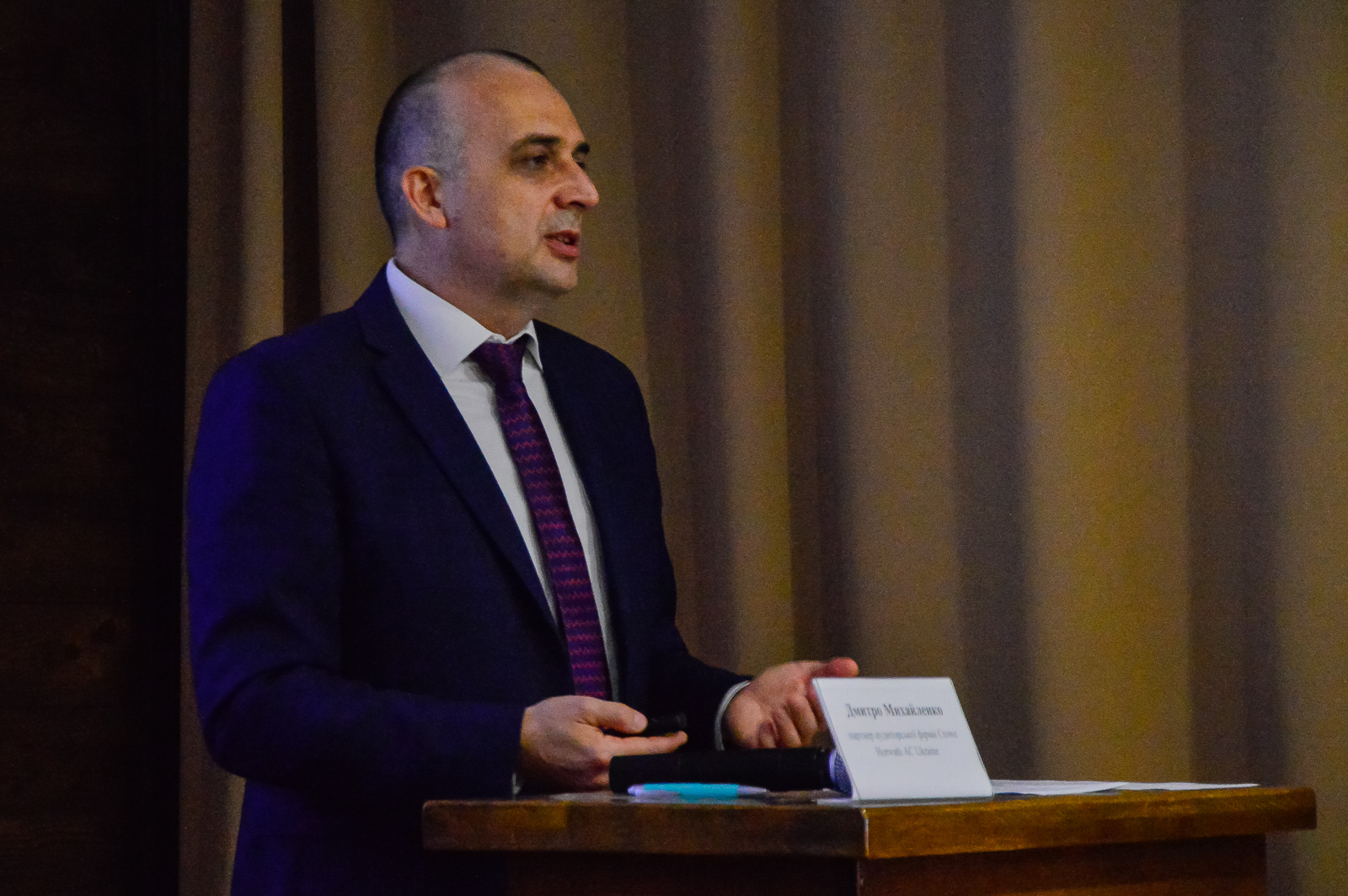
“A controlled transaction in 2017 as such shall be considered a transaction with a company from the List from July 27 till December 31, 2017, for this purpose, the value of the transaction shall be calculated for the whole 2017”, Nikolay Mishin mentioned.
The speaker also noted, that if a certain legal entity has been included in the List it does not mean that it automatically is considered as a company that is not paying taxes at the seat of registration. Should the case be that the party of the transaction is paying taxes but somehow was included in the List, a letter has to be submitted to the tax authority that the tax has been levied in the current year. Such party has to contact the local tax authority and ask for the proper letter and properly register it with the relevant embassy, make an official translation and submit it to the FSU.
Regarding the transactions with commodities under the rules of exchanges, the speaker stressed, the taxpayer has to prove to the fiscal authorities, that:
- The price terms are set on the day the contract has been concluded;
- The contract is truly a forward or futures deal (entered into in accordance with the Cabinet of Ministers of Ukraine Order No. 632 dd 04.19.1999; were all the terms and conditions are set on the date it is concluded; and the taxpayer has informed the FSU within 10 days that it entered into such a contract).
“As of today, we have two court decisions (one of which has gone through two appeals) that are the first rulings as to the transfer pricing disputes, whereas additional tax has been indicted together with a fine”, warned Nikolay Mishin.
In the closing sentences, the speaker recommended submiting the Transfer pricing reports for 2016 before the deadline (as the final date of October 1 is Sunday so the closing date will be October 2), as there is always a possibility of a technical malfunction. For those who have submitted the report in July with the old form, advised, to resubmit it with the new form and make a note that it is the second one.
Irina Sivolap, Head of Section on Transfer pricing in the Department of Revenue and Duties of Legal Entities of FSU, began her address stopping on the distinctions in filling in and submitting the report, such as, that the taxpayer has to get two receipts.
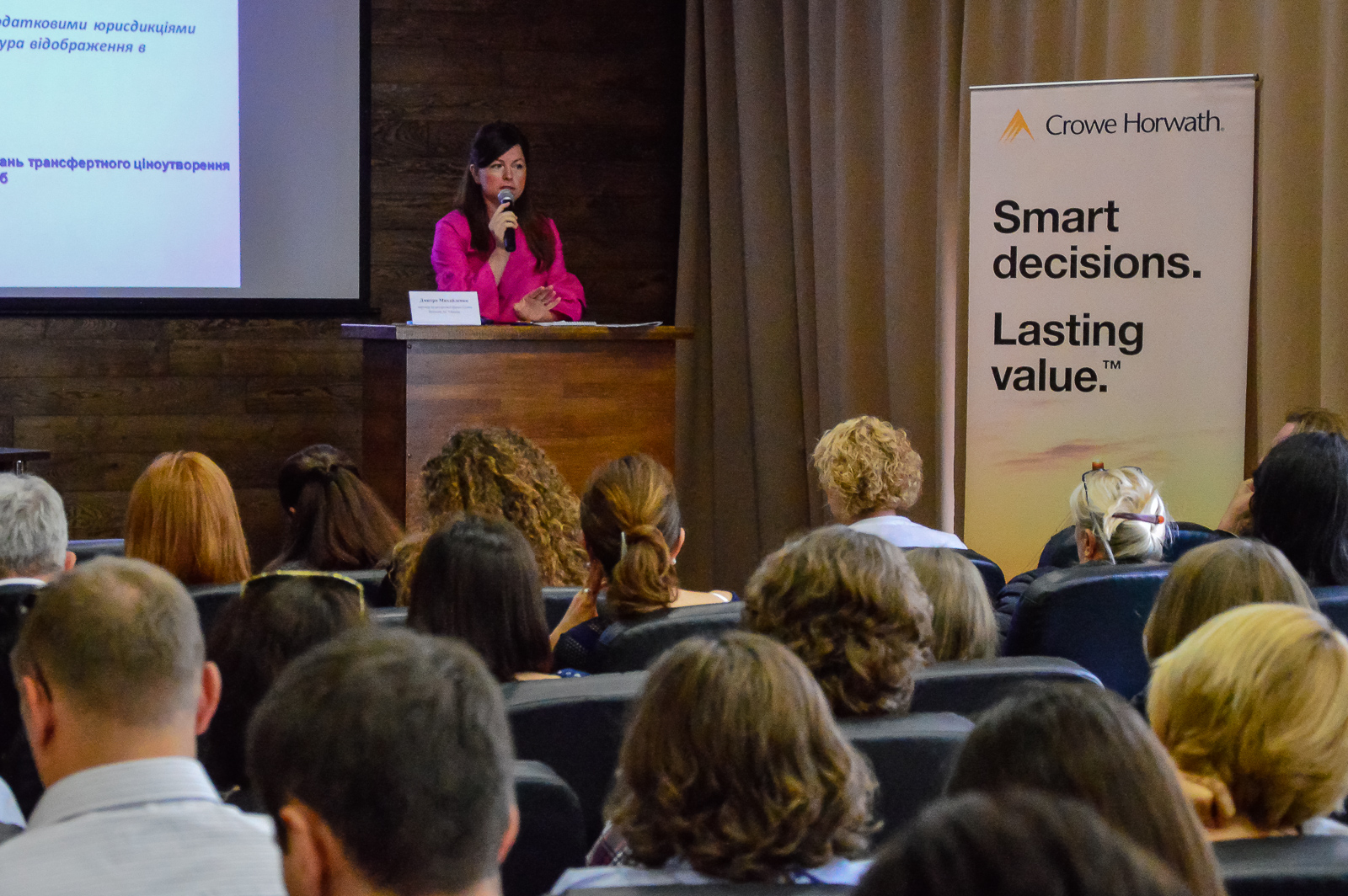
Regarding making corrections the speaker has informed, that the adjustments to the financial result can be made only in the direction of enlargement. “If the tax audit of the company has begun, adjustments to the report and submission of a corrected report are not allowed as the fine for lowering the financial result before tax is 25% of the amount of understated”, Irina Sivolap warned.
Stanislav Lobko, the Senior associate of Crowe Horwath AC Ukraine, has told about the sources of information that can be used for preparing the supplementary documents for the Transfer pricing report, they are:
- Internal transactions (transactions with nob-related parties);
- Open sources of information (Ruslana, Orbis);
- Information obtained by the taxpayer himself and handed over to the inspecting authorities;
- Information obtained in the course of exchange of information.
The speaker has pointed out, to pay close attention to the terms of deliveries of goods as the delivery costs are absorbed by the price of goods; and to payment terms. Furthermore, the speaker brought out the topic of choosing the approaches to verification of the market value.

In the closing words of his address, the attention has been given to the mistakes the taxpayer make while preparing the supplementary documents for the Transfer pricing report.
- Disregarding the internal comparable transactions;
- Neglecting the primary sources of information;
- Insufficient analysis;
- Extensive use of the fourth method of price verification when other methods are viable;
- Reliance on inadmissible sources.
Olga Bogdanova, Partner of Crowe Horwath AC Ukraine, introduced to the participants of the event the software that allows partially to automate the process of filling in the report and preparing the supporting documents. Out of the wide range of products the speaker has put emphasis on the following ones:
- com.ua (has a small database but affordable);
- ASTRA automated system of transfer pricing analysis (developed by Interfax, designated more for the Russian market);
- Global Reference Solution;
- Bureau van Dijk products (TP Catalyst).
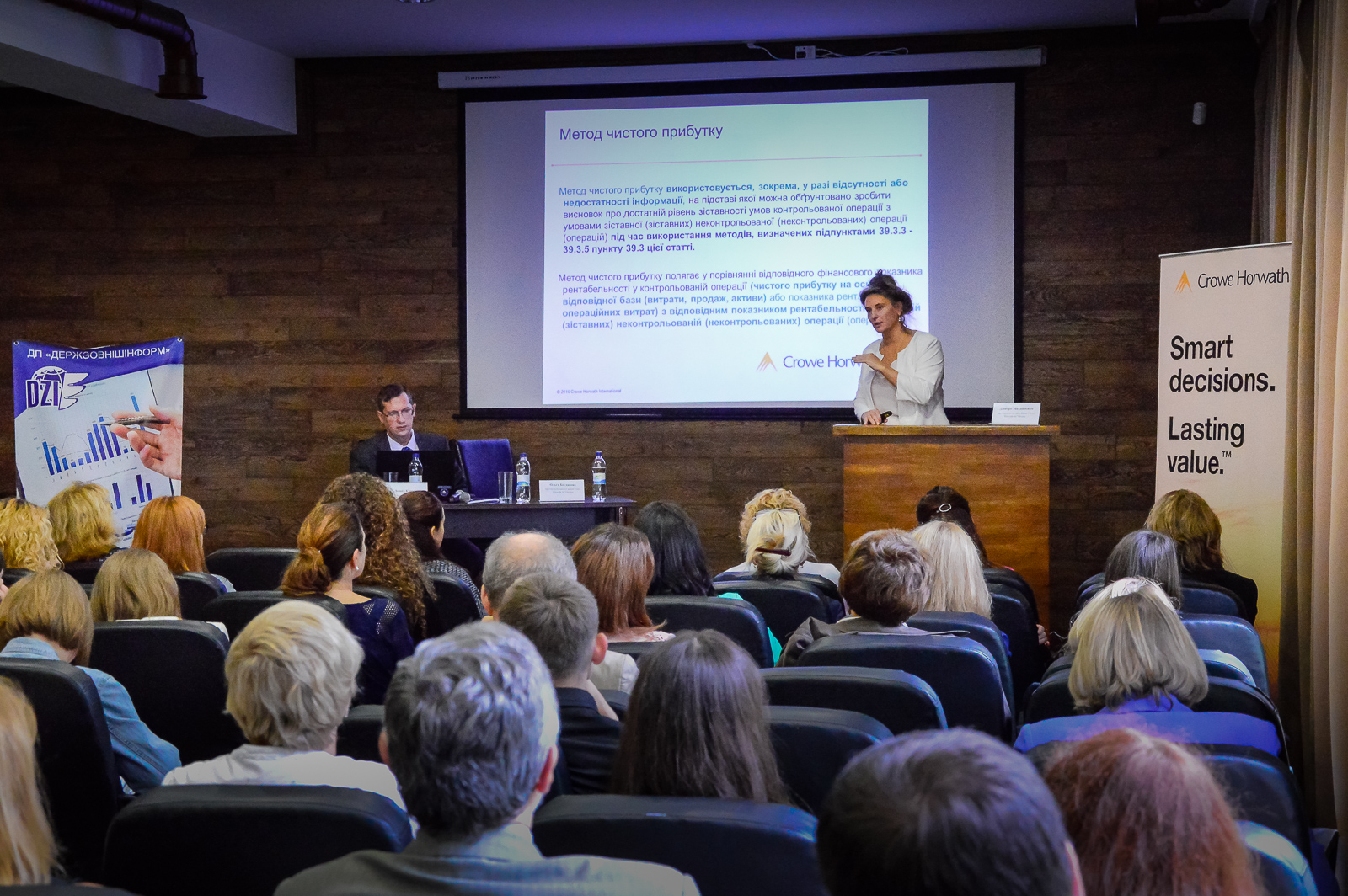
While using such databases consideration has to be given to:
- Code of economic activity;
- Time span, with close attention to the losses of the company in the reported year and growth of business activity even with incurred losses;
- Related parties.
The prepared sampling must be as vast as possible in order to compare as much information available.
Leonid Karpov, Partner of Crowe Horwath AC Ukraine, centered his speech around matters related to borrowings from non-resident companies and financial leasing.
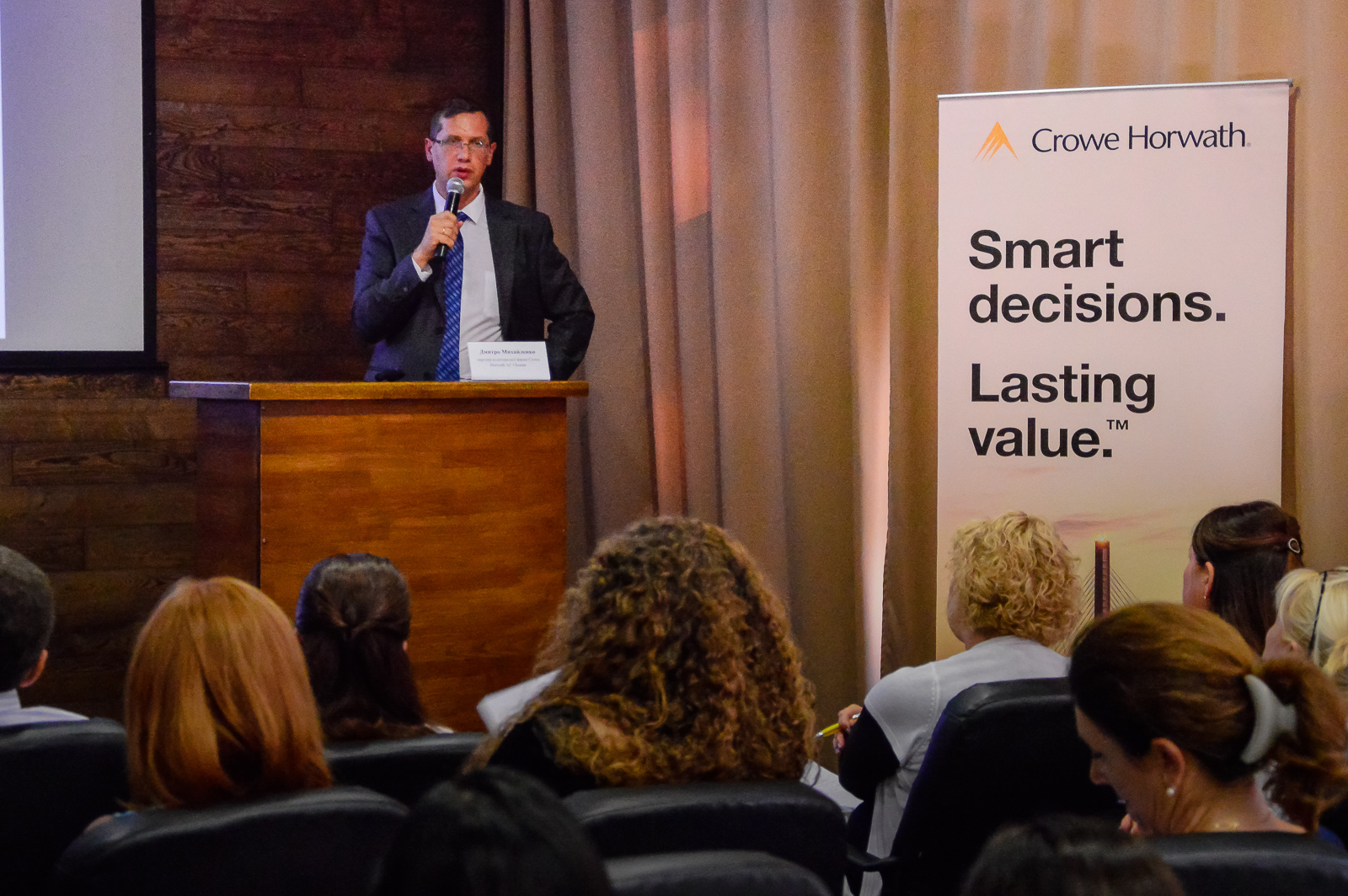
First of all, he stopped on the factors that lead to tax inspections in connection with borrowings, distinguishing the three main ones:
- Big spread differences in exchange rates;
- Low credit ranking of Ukraine;
- Uncovered credits.
When looking at comparable transactions the taxpayer has to search for the unbeneficial debtor and assess:
- Credit ranking of the debtor;
- Search results on comparable credits;
- Bond search results.
As to financial leasing operations, Leonid Karpov has noted, that the following transactions shall be considered as related:
- Reception of production equipment;
- Accrual of interest;
- The buy-out of equipment.
In the circumstance when the debt was written-off or it is a deal with Credit-Linked Note it is practically impossible to find a comparable transaction thus, as an exceptional case, they can be considered as a premium or discount. In other situations, when goods have been shipped for resale but within the reporting period, it has not been totally sold then, when preparing the report and the supporting documents the data must be used from the reporting year and the next year if there have been sales.
Anton Porembskiy, Head of the Department of Agro-industrial Complex and Agribusiness of the SE DZI, has introduced the company and described how one can obtain an official price verification letter for the goods in a prompt and reliable manner taking into account a number of criteria such as the specifics of goods, delivery terms, and other conditions.

Helen Zhukova, Director of Saivena-Audit, has started an interesting discussion as to price verification for receiving an irrevocable financial aid and procurement of fixed assets. As to the issue of irrevocable financial aid the problem is that none of the verification methods are applicable, but Nikolay Mishin retorted and insisted that in the explanatory notes (instructions) there is a clear directive that the purpose of the irrevocable financial aid and for what it was intended for has to be stated as it could have been the payment for the goods shipped but not paid for, as an example.
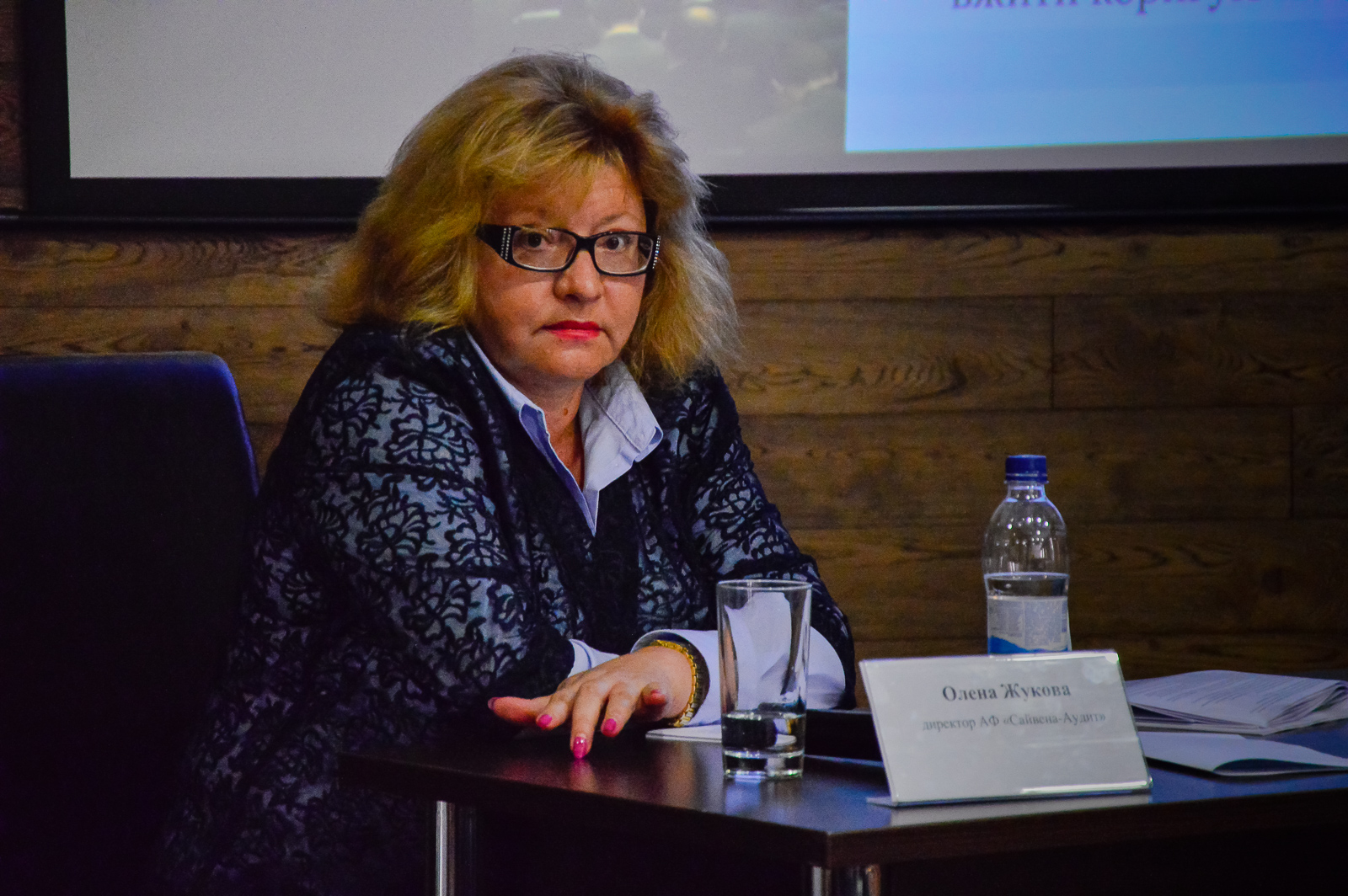
Regarding the verification of prices for procurement of fixed assets, the Head of Inspection Department on Transfer Pricing of FSU, suggested that the first method can be used in the case that the equipment is sold to related and non-related parties; or the fourth method can be utilized, when the fixed assets are assessed as to the profitability old compared to new.
At the end of the seminar, a Q&A session was held.
All professionals that attended the event have been given certificates of participation.



